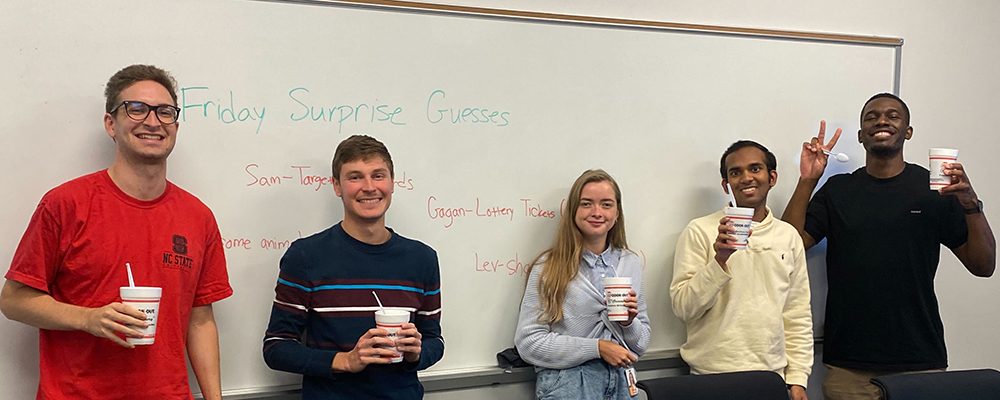Like many students at the Institute, I completed the PCEP (Entry Level Python Programmer) certification, which solidified my grasp of Python programming fundamentals. However, my programming journey is far from over.
While strengthening my coding skills, I have noticed many similarities between learning a programming language and a foreign language.
The constant learning it takes to grasp a world language has hidden potential to enhance my programming skills. Whether new to programming or a polyglot, stick around to discover the 6 parallels you can harness to acquire a new language.
1. Vocabulary: Building Blocks of Communication
Focusing on vocabulary is crucial for essential communication in the early language learning stages. Similarly, as novice programmers, grasping fundamental concepts like data types, functions, variables, and loops lays the foundation for coding fluency.
For example, in Spanish, one of the most common comical mishaps is the misunderstanding between “yo soy embarazada” (“I am pregnant”) and “estoy avergonzada” (“I am embarrassed”). Similarly, understanding the distinction between data types is crucial in programming to avoid errors and create logical code.
2. Grammar: Structuring Thoughts and Algorithms
Grammar rules organize words into coherent sentences, allowing effective communication. In programming, syntax rules dictate how code is structured, impacting its functionality, This is similar to the way grammar guides our linguistic expression by organizing our words into coherent and effective sentences. Understanding the syntax is essential to crafting functional code that executes as intended.
Consider this example in French: “J’ai manges la pomme.” With incorrect word order, this sentence translates to “I have the eats apple” instead of “I have eaten the apple.” Similarly, improper placement of parentheses or missing semicolons in code can lead to syntax errors that prevent successful compilation or execution.
3. Phonetics: Pronunciation and Syntax Precision
Phonetics is a crucial part of language learning that we should spend more time on. It can transform your ability to speak more fluently in the same way that paying attention to code syntax ensures that programs run smoothly. Mispronunciations can hinder language comprehension, while syntax errors can disrupt code execution. Both scenarios emphasize the significance of precision and attention to detail.
A perfect example is seen in German; the umlaut (ä, ö, ü) significantly impacts pronunciation. “Mähen” means “to mow,” while “Machen” means “to make.” The distinction is subtle but crucial. Placing a single comma or a missed quotation mark in programming can lead to syntax errors.
4. Advanced Phonetics and Idiomatic Expressions: Optimizing Code and Communication
Okay, so I love phonetics.
Advanced language learners master nuances like idiomatic expressions for natural-sounding speech. In programming, optimizing code involves understanding advanced features and best practices. Just as idioms reflect cultural fluency, incorporating advanced coding techniques demonstrates mastery of a programming language.
In Spanish, using idiomatic expressions like “ponerse las pilas” (literally “put on the batteries”) means “to get to work.” Similarly, in Python programming, utilizing list comprehensions instead of traditional loops showcases a deeper understanding of the language’s capabilities.
5. Immersion: Consistent Practice for Mastery
Becoming fluent in a language is enhanced by immersive experiences where communication is regular and unstructured. Likewise, continuous coding practice accelerates programming prowess. Just as living in a foreign country forces language use, working on real-world projects provides the consistent application of programming skills needed to move to the next level.
6. Continuous Learning: Adapting to Evolving Structures
Languages constantly evolve, with new words and expressions becoming part of everyday use.
Imagine my surprise when I visited Spain. Everyone used a verb form that I was told I would never use. Programming languages also update, introducing new libraries and syntax that ultimately expand the robustness of programming capabilities and efficiency. Embracing lifelong learning is vital in both language acquisition and programming proficiency.
As I navigate learning to program and learning more languages, I can’t help but draw parallels between the two. The journey from vocabulary acquisition to complete immersion resonates strongly with the stages of both fields.
Whether learning a world language or a programming language, embracing the similarities can provide valuable insights and strategies to accelerate your progress and success.
So, whether you’re delving into linguistics or embarking on coding adventures, remember that patience, practice, and continuous learning will guide you toward mastery.
Happy learning! | Bonne chance! | Viel Erfolg! | print(“Good Luck!”)
Columnist Shaun Gille
